Peter MALONE
Saturday, 18 September 2021 19:45
Bone Collector, The
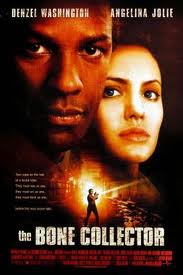
THE BONE COLLECTOR
US, 1999, 118 minutes, Colour.
Denzel Washington, Angelina Jolie, Queen Latifah, Michael Rooker, Mike Mc Glone, Luis Guzman, Leiland Orser, John Benjamin Hickey, Ed O'Neill.
Directed by Phillip Noyce.
The Bone Collector is based on a novel by well-known crime writer, Jeffery Deaver. It focuses on painstaking detective work, especially focusing on a decorated detective and author who has been made a quadriplegic in a freak accident at the scene of a crime. Despairing, he has arranged his own death when he becomes a vegetable after a spasm. However, he is invited to investigate a case. The scene of the crime was discovered by a young rookie, Angelina Jolie, who, it emerges, is still in grief over the suicide of her police officer father.
The film focuses on Washington in his bed, using all kinds of technology to be in contact with Jolie, who is his eyes and ears at the crime scenes. At first, she is repelled by what she sees, especially the mutilated corpses. However, she gains control of herself and together they solve the crime.
There is good support from Queen Latifah as Thelma, Denzel Washington's nurse. Michael Rooker, instead of playing a criminal, is the incompetent police chief. Other police include Mike Mc Glone, Luiz Guzman and a genial Ed O'Neill.
The film is dark, the murderer picking up his victims in a taxi, using a book of the turn of the century to use as model for his killings - and, it emerges, to take revenge on Washington, who had given an adverse opinion on a case with which the murderer was involved and had led to his being sentenced for six years. He attempts his revenge - but is saved, too slickly, at the ultimate moment.
The film is an interesting take on new police procedures, the complementarity of the immobile Washington with Jolie at the scene of the crime. The film was directed by Phillip Noyce who, in Hollywood, directed Patriot Games, Slither, Clear and Present Danger, The Saint. He later moved to lower-budget films and greater critical success with Rabbit- Proof Fence and The Quiet American.
1. The impact of the film? Its subject matter, crime, detection? The complementarity of the immobile detective and the rookie at the scene of the crime? The plausibility of the crimes, the investigation, the solving of the mystery?
2. The New York settings, underground, the darkness, sewers and rats, the uglier, seamier side of a city? On the surface, the streets, the apartments? The musical score?
3. The title, its reference to what the killer was doing, his capacities as a medical assistant, souvenirs? The opening credits and the 19th century book, the illustrations? The killer leaving clues for Lincoln? Putting them together, the publisher's logo, the finding of the book, the illustrations, the realisation by Amelia that the killer was modelling himself on the book? Her going to the scenes of the crime, the final confrontation and the revelation of the truth?
4. The opening, Lincoln Rhyme and his abilities, the accident? Quadriplegic, in his bed, despair, persuading his doctor friend that he would terminate his life if he had a spasm and became a vegetable? His lying in bed, the technology around him? Thelma and her care of him? The visit by Paulie and the introduction to the case? His getting interested, sitting up, the technology in his room? The meeting with Amelia? The collecting of evidence? The hostility of the police chief and his obtuseness? The other police and their support? Rhyme and his sitting in his bed, watching, guiding Amelia? Her breaking off, her change of heart? The recurrence of his spasms, Thelma's response, Amelia's response and care? The visit of Richard Thompson and his assistance? The development of the case, the further murders, the maps, the underground, the book logo and the jigsaw? The build-up to the final murders, contact with Amelia, the contact broken? The visit by Richard Thompson, the killing of Thelma and the police guard, the confrontation, the fight, Rhyme using his body, his teeth to confront Thompson? His about to be killed? His deciding to live, the Christmas celebration, the friendship with Amelia and the tenderness? A portrait of a police detective?
5. The contrast with Amelia, the memories of her father, his suicide, her grief? Her relationships and their lack of commitment? Her being on the job, her being urged to look at a scene, finding the body? Her decision to stop the train? The reaction of the police chief, the support of the officers? Her photographing the evidence? Her being invited by Rhyme to be his eyes, going down the manhole, the explosions and the steam in the New York streets? The inability to save the woman victim? Her discovering the other bodies, the rats, her rushing from the scene? Her not wanting to continue, Rhyme looking up the information about her, persuading her to continue? Her work, the hostility of the chief, her taking the evidence to Rhyme? The jigsaw, her going to the bookshop, finding the book? Realising where the old man and the child would be, going to save them, the realisation that Rhyme was the target, her return, shooting the killer just in time? Her tenderness for Rhyme, during his fit, watching him sleep? The Christmas celebration and her presence?
6. The killer, in the background? Picking up the victims in the taxi, never being seen - the affluent couple and the killing of the man, the woman tied up in the subway? The man taken and hanging with the rats attacking him? The other murders, the old man and the child and in the water? His coming to Rhyme, killing Thelma? His explanation of the opinions, Rhyme as an expert, questioning his opinions, his going to jail, wanting revenge? The viciousness of the fight with Rhyme? His being shot?
7. The portrait of the police, the chief and his arrogance, obtuseness, laying down the law, putting Amelia off the case? His gaffes? The other police, their friendship with Rhyme, the visits, giving him information, moral support?
8. Thelma, the dependable nurse, her care for Rhyme, his spasms? Audience response to the brutality of her murder?
9. The victims, the couple in the taxi and realising their fate, the man taken, the old man and the child?
10. The plausibility of the plot, this kind of serial killer, motivations, brutality, random victims? The credibility of the police work, the detection, the intuitions necessarily for putting the pieces together, the presence at the scene of the crime with all the detail being collected and presented?
Published in Movie Reviews
Published in
Movie Reviews
Tagged under
Saturday, 18 September 2021 19:45
Bundy/ 2002
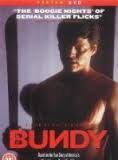
BUNDY
UK/US, 2002, 99 minutes, Colour.
Michael Riley Burke, Boati Ann Bliss.
Directed by Matthew Bright.
Bundy is a portrait/study of serial killer Ted Bundy. Bundy was a narcissistic, surface-charming, brutal man who may have murdered over a hundred women.
There have been many portraits of serial killers during the 80s and 90s, some fiction like Natural Born Killers or the tales of Hannibal Lector (who derives his origins from the Wisconsin 50s killer, Ed Gein). Steven Johnstone wrote a screenplay which was made into a portrait of Ed Gein. He also wrote this screenplay. It was intended as the second part of a trilogy on serial killers in an American- British co-production series.
Michael Riley Burke brings an initial breeziness to his portrait of Bundy. However, as he is rejected more and more by the women (except for his girlfriend Lee), he shows further signs of madness, ultimately leading to a split personality approach to life, surface respectability and inner torment. This continues after he escapes from jail. However, he is finally caught and the finale of the film is a very grim presentation of his execution. This means that the film is more of a sketch of what Bundy did, some glimpses of the strange psychology which motivated him, some suggestions of the brutality of his criminal activity. With the execution of Bundy, it brings the film to a grim and moralising end. Bundy has become a significant part of American consciousness of the impact of serial killers.
1. Audience knowledge of Ted Bundy, one of the earliest of the diagnosed serial killers? His brutality in the 70s, prison, execution?
2. How well did the film dramatise the personality of the serial killer, his methods, the killings, the repercussions on himself, on others? How credible, how authentic, how sensationalist?
3. The 1970s, the initial setting of Seattle, the town, the countryside? 1975 and Bundy travelling across the United States, Utah and Oklahoma? His arrest, the Colorado prison? His escape, moving to the east coast, the sunny settings and his holiday, his arrest? The sequences of the prison?
4. The importance of the execution sequence for the drama of the film and audience response to the serial killer? The ugly details of the execution, the preparations, the cloth in the anus of the prisoner? The physical repercussions? The actual execution?
5. Theodore Bundy, the law student, seeming charm, driving around, seeing him stealing - and moral judgment on him and his behaviour? His flirting with the women, the young woman he followed home, spying, his frustration, sexual activity? The frustration and his brutality with the woman and the crowbar? Gradually building up his aggression towards women, in the dormitory, the bludgeoning of the women, getting the women to come into his car, in the woods? The travel across America, the range of victims? The woman who resisted, her running away, leading to his arrest?
6. The arrest, the trial, in prison? His cheerfulness, his reaction with the prisoners, his estimation of himself? The talk with Lee? His escaping, further murders? His disguise, sitting on the porch, seeming a normal person? His arrest?
7. Lee, single mother, her love for Bundy, her listening to him, his sexual demands, her compliance? Her visiting him in prison, her disbelief, her realisation that the accusations were true?
8. The portrait of the victims, ordinary women, resisting Bundy, the brutality towards them? His psychological state, mental development, emotional lack of development? The compensation, the violence, the frustration? What insights did the film offer into the mentality of a serial killer?
Published in Movie Reviews
Published in
Movie Reviews
Tagged under
Saturday, 18 September 2021 19:45
Bunker, The

THE BUNKER
UK, 2000, 92 minutes, Colour.
Charlie Boorman, John Carlisle, Jack Davenport, Christopher Fairbank, Jason Flemyng.
Directed by Rob Green.
This is tough going. The action takes place over two days towards the end of 1944 in the Ardennes. The Americans are forcing the Germans to retreat. A small squad of Germans is forced back to a bunker on the Maginot line, an extraordinary warren of tunnels and storerooms. The opening caption quotes Nietszche saying that if we stare into the abyss long enough, the abyss stares back. That is what happens to these men. They stare at their fears, the claustrophobic experience, their personal antagonisms, their courage and their cowardice. They are trapped in a physical and psychological maze that makes them fear the Americans are in the bunker stalking them. They also have personal memories of being in an execution squad which is more than aggravated when they stumble on an old cemetery filled with skulls and bones.
It is all well acted. The set is convincing. The moments of fright and psychological horror effectively paced. But most of us will ask whether we really wanting to be watching it no matter how well made it is.
1. The impact of the film? A war film? Psychological thriller? Horror film? The combination of each of these elements?
2. The World War II settings, France, the trenches, the forest, the fog? The focus on a German platoon, the role of the Americans in pursuing the Germans?
3. The focus on the Germans, 1944, the ending of the war, the Germans in retreat? The German experience, the Nazi oppression, the massacres, warfare?
4. The focus on the men's consciences, the final revelation of the massacre and the participation? Each of the individuals, their personality, their guilts, their fears? The surfacing of these fears, the projection of the psychological states into the real world? The men haunting themselves, one another? Violence erupting, the violence towards one another?
5. The plausibility of the plot, the psychological dimension? The credibility of the soldiers' behaviour? Their German ethos?
6. The picturing of the bunker itself, the vastness, the tunnels, the darkness? The skulls, the bones? Being built on a mediaeval tomb? The place of a massacre, the mass grave?
7. Corporal Baumann as the focus of the film, the others who despised him, their accusations that he wanted to desert? His handling of the situation? The pursuit of Kreuzmann, his post-traumatic stress and rushing into the tunnels? Baumann and Ebert pursuing, Ebert and his sudden death? The second American attack? The fears that the Americans were in the tunnels? Baumann finding the insane Kreuzmann, the mummified corpses? Baumann surviving, burrowing to the surface, his recovery, the memory of the events, the flashbacks to the murder of the deserters, his being forced to participate? His being with Neumann, deciding to surrender, walking into the forest?
8. The characters of the members of the platoon, Schenke and his taking benzedrene, his suspicions, his being hyped up, his killing Kreuzmann, the roof collapsing and killing Krupp, Schenke crazed, blowing up the munitions, the firefight and the other members of the platoon, his thinking they were the enemy? Schenke and his having been in charge of the mass killing of the deserters? Krupp, his discovering the munitions, his personality, his death? Mirus, the old man, holding the bunker, with Neumann, his knowing about the munitions, the locked door, knowing about the mass grave? Mirus and his belief about the ghost, his dead son, the evil spirits in the bunker, wanting to contain them, wanting to be free, caught in the barbed wire, his death? Ebert and his age, being with Baumann, the search, his death? Sergeant Heydrich, authority, his relationship with the others, searching with Baumann and Frankie, the discovery of Kreutzmann, his death?
9. The psychological portrayal of inner demons, of individuals, of the Nazi psyche, manifesting through the personalities of the soldiers? Destructively? The possibilities of heroism, survival?
Published in Movie Reviews
Published in
Movie Reviews
Tagged under
Saturday, 18 September 2021 19:45
Back in the USSR
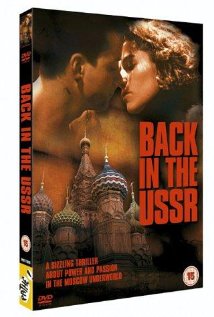
BACK IN THE USSR
US, 1992, 83 minutes, Colour.
Frank Whaley, Natalya Negoda, Roman Polanski, Dey Young.
Directed by Deran Sarafian.
Back in the USSR takes its title from the Lennon- Mc Cartney song but is not in that league. It is a weak comedy-thriller, set soon after the collapse of the Soviet Empire in a Moscow which is becoming dominated by corruption, and the emergence of the Russian Mafia. Frank Whaley plays one of those American tourists that ought not be allowed out of America, let alone given a visa. All he seems to be wanting is what he calls "a good time". However, in a moment of chivalry, he becomes involved in quite a mess, the stealing of an icon, a prostitute trying to get it for the Mafia, the Mafia bosses thinking they have been betrayed, muggings and robberies in the street. He behaves as an American tourist, demanding to speak English, where he is told that he ought to learn Russian!
The film ends with his heroics and his emergence as a kind of superhero who is able to solve all the problems as well as falling in love with the young prostitute. Perhaps the only reason for seeing the film is the presence of Roman Polanski in a substantial role as a Mafia chief.
1. The limited release of this film? Entertainment value? Interest in the Russian Mafia? The picturing of Moscow soon after the collapse of the Soviet Empire?
2. The Moscow settings, authenticity, the streets, clubs, warehouses? The scenic and touristic background? The musical score - and the title song?
3. Archer and his obtuseness, wanting a good time, exasperation with the concierge and his visa, going to the clubs? His seeing the young woman, following her, at the club, getting involved with the stealing of the icon? Going to the apartment, her collaborators? His leaving, being mugged, the stealing of the icon? His being pursued by the Mafia, by the police? His various adventures, retracing his steps, the dangers? The final heroism, his getting the icon back? Visit to the American Embassy, his exasperation, his being used by the assistant, Claudia? The ambassador finally realising the truth? His leaving as a hero? Transformed or not?
4. Lena, with the icon thief, taking the bag, being pursued, her friends, prostitution, her links with the Mafia chief? The attraction towards Archer? The shared adventures, the dangers? The happy ending for the future?
5. The opening of the film with the icon, the sale, the hijacking, the death of the monk? The authority and his collection? His brutality and shooting people, confronting the Mafia? The portrait of official corruption?
6. The young people in Moscow, the clubs, drugs, sex, the contrast with life under communist rule? The Mafia, the confrontations, using wits, cars, shootouts, stabbings?
7. Kurilov and Roman Polanski's presence and performance? Menacing, the pursuit, the demands, the dangers, his henchmen, deaths?
8. The American ambassador, his exasperation, Claudia and her presence, the connection with Kurilov, on the plane, her luggage being checked? Her being exposed as a thief?
9. The overall impact of this kind of film - as entertainment, as a portrait of Americans in Europe, as a picture of the post-Soviet Union?
Published in Movie Reviews
Published in
Movie Reviews
Tagged under
Saturday, 18 September 2021 19:45
Blue Crush
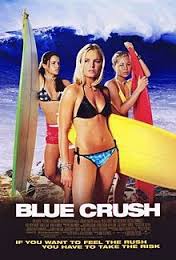
BLUE CRUSH
US, 2002, 104 minutes, Colour.
Kate Bosworth, Michelle Rodriguez, Matthew Davis, Sanoe Lake, Mika Boorem.
Directed by John Stockwell.
What has this light and entertaining surf movie (at least for those who love watching enormous waves swelling and breaking) in common with the clever comedy, Adaptation? When you look at the credits, you will see that it is based on an article, Surf Girls of Maui, by Susan Orlean (the orchid article writer played by Meryl Streep in the film). And that is what Blue Crush is about, surf girls on the north beach of Oahu.
The plot is the old standby: young girl overcomes all obstacles, macho prejudice, falling out with friends, falling in love with the tall, dark and handsome stranger, being haunted by nightmares of hitting her head on a rock and drowning while surfing, doing a wonderful ride and then being overcome by her fears but urged on by a kindly competitor and then doing the ride of her life. I don't think that that spoils the film - we knew this more or less before the film started.
Kate Bosworth is an energetic school dropout turned hotel cleaning maid turned champion. Matthew Davis is the romantic football star. Michelle Rodriguez is the best friend coach with a touch of jealousy. But the star is the Hawaian coast, the magnificent waves which are filmed from a distance, close-up and under and within with special handheld cameras - and with pounding sound engineering. Enjoyable but not deep except when the waves send the capsized surfers under.
1. The popularity of surfing, the tradition of surf movies? Men as surfers? The focus on women as surfers?
2. The original article on which the film was based, the women surfers of Maui?
3. The Hawaiian locations, the coast, the towns, the resorts, the hotels? The musical score and songs?
4. The water photography, the cameras for getting within the waves, the dramatic impact of the visualising of the waves, their crashing, their weight, their dangers, the exhilaration of the surfers? The sound engineering for the impact of the sounds of the waves?
5. The focus on the young women, the comparisons with the men, asserting themselves, achievement in their own right? The attitudes of the men, criticism, spurning? Others supporting?
6. The focus on the group, their rooming together, their school background, dropping out, working in the hotel, their work as maids, their enjoying it, trying on the dresses, their disgust at the footballers' filthy rooms? Anne-Marie? giving a lecture to the surfer about his room? The discipline of the maids, Anne- Marie being sacked, the others resigning? The care for Penny, their mother having left, Penny and school, her rebelling, hanging out in the clubs? Her support of her sister?
7. The focus on Anne- Marie, age and experience, her skill with the surf? The nightmares and her drowning, hitting her head? The reality later in the competition? Her relationship with the rest of the girls, getting them up, surfing, practice with Eden? Carrying the weight underwater, endurance tests? Her skills, the work, the lecture to the footballer, the encounter with Matt, attracted, his company, Eden criticising her for letting practice go, the relationship? His support? The build-up to the competition, the men and their taunting her? Her initial success, her fears, the nightmares, going out on the waves, her competitor urging her on and her success in going through the Pipestream? Her not winning but knowing her personal achievement?
8. Matt, the footballer, genial, with Anne- Marie, the phone call from his niece, their time together, the relationship, its future? The lessons and the payment? His supporting her during the competition?
9. Eden, her relationship with Anne- Marie, jealousy, urging her on, moody, the training, spurning Matt? The competition and her urging her on? The contrast with Lena and her easygoing style, friendship, surfing, support?
10. The men, surfing, taunting, fighting Matt? The macho style? Their admiration for Anne- Marie and her success? Getting the photo taken with Matt because he was a sports star?
11. The footballers, the wealth, the expensive rooms, the management and the service to the footballers, no matter what they did? Their getting lessons from Anne- Marie and the others, the collage of their training and working on the waves?
12. The drama of the waves, the Pacific Ocean around Hawaii, the magnitude of the waves, the ability of the surfers, the surfers' community and their exhilaration in their sport?
Published in Movie Reviews
Published in
Movie Reviews
Tagged under
Saturday, 18 September 2021 19:45
Broken Wings
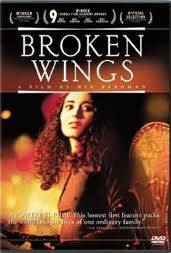
BROKEN WINGS
Israel, 2002, 87 minutes, Colour.
Orli Zilbershatz- Banai, Maya Maron, Nitai Gvirtz, Vladimir Freedman, Dana Ifgy, Daniel Maygon, Eliana Maygon.
Directed by Nir Bergman.
Broken Wings is a contemporary story set in Israel, in the city of Haifa (the city of the director).
The film opens with a young seventeen-year-old singing a song on the roof of a building near the central railway station. It emerges that she has composed a song, is singing it with her boyfriend. However, all is not easy. When we see her family, she clashes vigorously with her mother. It emerges that her father has died nine months earlier and she blames herself for his being accidentally stung by a bee, being allergic, and not able to withstand the injection. Since then, she has clashed with her mother, her mother being on night shift at the hospital and sleeping during the day. It is September, the opening of the school year, the youngest daughter getting ready to go to kindergarten, the young boy very angry and wanting to break a record by jumping into a dry pool, the oldest boy alienated and dressing up as a mouse, handing out leaflets in the town.
The film focuses on the relationships, the tensions and the various reactions after the death of the father. While the family is middle class, comfortable, and able to sustain itself, it shows itself particularly dysfunctional and unhappy, at times suicidal.
The performances are excellent, especially Orli Silbershatz- Banai as the harassed mother. The young Maya Maron is Maya, the alienated daughter who confronts her mother, runs away to record the song she composed for her father but, in grief, is unable to complete it.
The film relates to most First- World people's lives, people with creature comforts, but still with relationships unresolved, seething angers bursting out, and the need for love and affirmation.
1. The title and its reference to the children of the family? The death of their father, the aftermath, the effect on their growing up?
2. The Haifa settings, the coast, the railway station, hospitals, homes and schools? The streets? The authentic atmosphere and sense of realism? The songs, the lyrics in memory of Maya's father? The musical score?
3. The title and its reference to the children? The harm done by the accidental death? Their not coping? The little girl and her wearing the wings to school? The boy diving and not having wings to save himself? Maya wanting to fly off? The older boy and his girlfriend sitting on the high window - and the possibility of falling without flying?
4. The portrait of the family, the absent father, seeing him in the videos, the basketball, the family's love for him, the ironic nature of his death?
5. The mother, her weariness, clashing with Maya, the fights, pushing the car? Her work at the hospital? The encounters with Valentin? Trying to get to the school for the little girl, on the back of the motorbike, her son's interpretation of this? Weary at home, the accusations that she was sleeping? Trying to do her best? The boy's fall and her reaction, the blaming of Maya? The rush to the hospital, sitting by him, wanting him to wake up, getting Valentin's help, her going to him, lying down beside him? Her slapping her daughter after the insult? At home, the phone call from Maya, going to get her, lifting her, their having to thumb a lift? The reconciliation between the two? Her joy at hearing the boy had woken up? The family together, the possibilities after this crisis for better relationships?
6. Maya, age, the death of her father, blaming herself? The song, antagonism towards her mother? With her little sister, taking her to school, with her boyfriend, forgetting to pick her up, the consequences?
7. Maya hurrying to the hospital, insulting her mother, the slaps? Cutting her hair, getting the train, going to the recording studio after turning it down, the confrontation with her boyfriend? Singing the song, watching the executive talking in loving terms to her little child, so often? Tears, the return? Ringing her brother, her mother listening, being rescued by her mother, pushing the car and hitchhiking? The reconciliation?
8. The little girl, her dependence on her mother, wanting her to be with her to take her to school? At home, not wanting to cross the road for her brother, going to the swimming pool, the video? Running home, the disaster? Learning to go to school and grow up?
9. The boy, his angers, at home, surly, pretending his sister had wet the bed? Wanting her to cross the street, the diving, the coma? His coming to? The reconciliation?
10. The older brother, not getting up, not wanting to go to school dressing as a mouse, giving out the leaflets? Clashes with his girlfriend? Alienation? With the school counsellor and his needing psychiatric treatment? His not going to school, his meeting Iris, basketball, the classroom, sitting naked on the windowsill? The relationship with her? His not being home, going to the hospital, watching the videos, supporting his mother, trying to wake his brother up? The possibility of settling down?
11. The doctor, his being in California, bumping into the mother, giving her a lift, her dependence on his advice - a possible relationship?
12. The boyfriend, singing with Maya, his making demands of her, at the recording?
13. The school, the counsellor, her interviews?
14. A slice of life in contemporary Israel - just within the family and the city (with no relationship or reference to any of the political clashes at the time)?
Published in Movie Reviews
Published in
Movie Reviews
Tagged under
Saturday, 18 September 2021 19:45
Boondock Saints, The
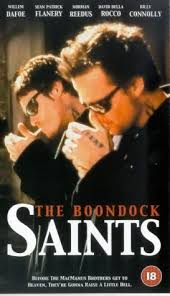
THE BOONDOCK SAINTS
US, 1999, 105 minutes, Colour.
Willem Dafoe, Sean Patrick Flanery, Norman Reedus.
Directed by Troy Duffy.
The Boondock Saints is a film about Boston gangsters and their pursuit by local police, who seem to be on their side, especially the Irish, and the FBI. It has the conventional gangster material, but is treated in extraordinarily strong operatic style (in the vein of Martin Scorsese's films). The film is stylish in its cinematography, editing, dramatic flourishes. It is also operatic in its presentation of explanations, events seen after the explanations, characters, especially FBI agent, artificially re-enacting some of the events and walking through the events while they are happening. The film is also highly blood-drenched.
This makes the film an oddity, not something that is immediately entertaining, difficult to follow at times, with repellent characters. The film highlights the 90s and the Irish Boston Mafia, their support by the local police and public opinion (calling them saints) and the contrast between the Russian Mafia which has arrived in the United States.
Sean Patrick Flanery and Norman Reedus are the two Irish Mc Manus brothers who start to wreak vengeance on the incoming Russian Mafia, brutally eliminating most of them with the help of their rather insane Italian friend, Rocco. Willem Dafoe is the FBI agent, vain, shrewd, intelligent, orchestrating (literally) to music his investigations. The film also highlights the fact that he is a gay man. When he overhears one of the brothers speaking to a priest in a confessional, where he himself had gone to get advice from a priest, he realises that the young men are doing the work that he really wants to do. He then continues to support them. They finally go to court - and are acquitted - and set out on a career of vigilanteism. However, writer-director Troy Duffy gives the audience something to think about as the television news interviewers ask various people on the Boston streets the pros and cons of their opinion on such vigilanteism. Opinion is divided.
1. The impact of the film? As a gangster film? Boston settings? The Irish and their clans? Their violence? The incoming European Mafia, especially from the former Soviet Union? The disruption of the traditional loyalties and boundaries?
2. The Boston settings, the authentic feel of the city, homes and bars, police precincts, the streets, warehouses, hotels? The feel of the 90s and the clashes of the Mafia? The musical score, the use of classical music, especially by the FBI agent?
3. The title, the support of the Irish in South Boston, public opinion, the newspaper headlines, the vigilantes being seen to be ridding the city of unwanted criminals and therefore saints? The finale with the interviews with the various people, the diversity of opinion?
4. The focus on the two boys, the initial sermon, the warnings from the priest, their lighting the candle and ignoring the priest? Their age, style, manner, bonding? Who was the leader? The bar, St Patrick's Day, the interactions with the barkeeper, his having to sell the bar? The Russians and their taunts? The police discovering the bodies of the Russians on the streets? The reconstruction of what they did, the fights, the violence, in the rooms, their being tied up and chained, one being about to be shot, the other throwing the lavatory on him, their taking the money?
5. The local police, support of the Irish, the speculations on the street, the various theories, especially the policeman with all his theories - and always wrong? Being sent by the agent to get the coffee? His saying they would disappear? Their turning up?
6. The FBI agent, his personality and style, dominance, intelligence and theory of detection, putting it into practice? His skills? His lording it over the others? His taking them on all the investigations, a kind of admiration group? His interview with the boys, his trying to understand the mystery, trying to understand them? The further killings, his literally conducting the investigations, reconstructing the scenes? His own personal life, the gay man, the man in his bedroom? His homophobic remarks in the gay bar? His interest in the boys, following their massacre in the hotel, reconstructing it? The speculations, the final shooting and his entering into the scene? His making the distinction between the Irish and the Italians? His drinking, frustration, going to the confessional, talking to the priest, overhearing the conversation? His decision to let the boys go, the courtroom scene, his own increasing vigilanteism? Willem Dafoe and his sinister presence and screen presence?
7. The boys themselves, their Irish bravado, the injuries, bashing the Russians, handcuffed, throwing the toilet? Giving themselves up? Their becoming heroes? The decision to massacre the incoming group? Their friend Rocco, his psychotic behaviour? How sane, insane theirs? Going through the ceiling, falling through the roof, hanging there and doing the shooting? The further shooting of the Mafia types? Their attitude towards the Mafia family? Wanting to escape, the clashes with their Italian friend? In the courtroom, their defence, their future?
8. The Italian family, the Mafia chiefs, Rocco and his telling the joke, his humble jobs? His being seen as a threat to expose everyone to the police? His own personal madness, violence? With the brothers, the massacre in the hotel? The aftermath, the further killings? The Mafia family itself, the chief? Finally in the court, the testimony, the lies?
9. The Eastern European Mafia types, muscling in, their confidence, meeting in the hotel - and the shock of the massacre?
10. The Boston police, the Boston media, the television coverage, the interviews?
11. The captions introducing all the characters? The film easy to follow? The role of each Mafia group? Law and order in Boston? Violence? The role of the FBI, the police? Vigilanteism?
Published in Movie Reviews
Published in
Movie Reviews
Tagged under
Saturday, 18 September 2021 19:45
Bigamist, The
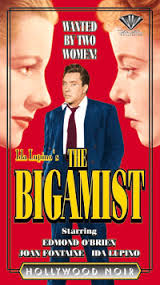
THE BIGAMIST
US, 1953, 79 minutes, Black and white.
Edmond O'Brien, Joan Fontaine, Ida Lupino, Edmund Gwenn, Kenneth Tobey, Jane Darwell.
Directed by Ida Lupino.
The Bigamist is a brief film about an ordinary salesman who finds himself, in an attempt to keep to his conscience, marrying for a second time. The film seems extraordinarily well-mannered by contemporary standards. In fact, it comes as something of a surprise to find that Ida Lupino is actually pregnant. Ida Lupino, after an acting career in the 30s and 40s, began to direct brief social-conscious films in the early 50s. They were only a few - although she directed The Trouble With Angels in the 60s. She appears as one of the wives, Joan Fontaine at her most elegant being the other. There is a framing investigation of the situation by Edmund Gwenn, an official from an adoption agency. (In the Hollywood homes tour that Edmond O'Brien and Ida Lupino do, there is a humorous in-reference to Edmund Gwenn and his home and his appearing in Miracle on 34th Street.)
The film raises the issues of looking behind the objective facts of a situation to the mental and moral attitude of the person convicted.
1. Impact of the film? In the 50s? It receiving adult and X certificates? Society and the issue of bigamy? By comparisons with later decades?
2. Black and white photography, San Francisco, Los Angeles, Hollywood settings, authentic locations? Musical score?
3. The title and its focus on the issue? The moral stance taken, the point made about the difference between bigamy and taking a mistress where the latter would be considered all right but the former a crime? The perceptions of the judge at the end of the film?
4. Ida Lupino, her direction, feminine sensibility, her performance?
5. Harry and his situation, his nervousness at the adoption centre, Mr Jordan noticing? At home with Eve? Going to Los Angeles, being discovered with Phyllis? The baby? His telling his story - a confession - to Mr Jordan? His situation with Eve, love, eight years of marriage, her inability to have a child, her hardening, doing the office work, setting up the company? His absences from home? His loneliness in Los Angeles, the Hollywood tour, meeting Phyllis, talking, going to the restaurant, the friendship, the dates, their enjoying each other's company, her falling in love, his telling Eve about her in general? His birthday, deciding to cut things off, Phyllis's gift - and it emerging later that she became pregnant that night? His trying to do the right thing, her pregnancy? His visit to her room, his dilemma, deciding to divorce Eve, marry Phyllis for the sake of the baby? His inability to tell the truth? His marrying Phyllis, the birth of the child? Phyllis discovering the truth, his moral dilemma, his decision to confess, his talking to Mr Jordan? In court, declaring himself guilty? The court's judgment, audience judgment on him?
6. Eve, glamorous, unable to have a child, eager for adoption? Her initial hesitance, he being hard and bitter, devoting herself to her work? Her father's illness, being away from home? In the court, hearing the news from her lawyer friend, looking back at Harry?
7. Phyllis, on the bus, lonely, hard-boiled? Taking Harry to the restaurant? Their talking, dates? Her falling in love, her story of disappointment during the war? His birthday, the gift, her being pregnant? Harry coming back after several months, the birth of the child, the wedding? Her discovering the truth and her reaction? In court?
8. Mr Jordan, doing his duty, suspicions of Harry, the questions, the companies in Los Angeles, finding him at home, hearing the baby, his dilemma about not wanting to shake his hand but feeling pity for him?
9. The friend, the lawyer, the advice, the plea in the court? The judge's comment?
10. A perception of the 50s and its moral stances and tone?
Published in Movie Reviews
Published in
Movie Reviews
Tagged under
Saturday, 18 September 2021 19:45
Best Things in Life Are Free, The
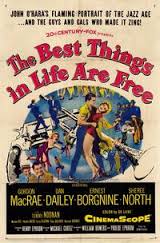
THE BEST THINGS IN LIFE ARE FREE
US, 1956, 104 minutes, Colour.
Gordon Mac Rae, Dan Dailey, Ernest Borgnine, Sheree North, Tommy Noonan.
Directed by Michael Curtiz.
The Best Things in Life are Free is a loose biography of the song writing team of Buddy De Sylva, Lew Brown and Ray Henderson. They were very successful during the 1920s. Their songs may have lost their popularity in subsequent decades, but they were a force on Broadway, in the records of the 20s and then in films.
Gordon MacRae? portrays Buddy De Sylva, the most ambitious of the group, the musical score writer. Ernest Borgnine, surprisingly, does a very good turn as a song-and-dance man. He is Lew Brown, has a background growing up with toughs in New York, is also able to throw a mean punch. Dan Dailey, always reliable in many musicals with Betty Grable, is the family man, Ray Henderson, the arranger of the songs. Sheree North, who had made Living it Up with Martin and Lewis and How To Be Very, Very Popular with Betty Grable, is a striking presence, especially in her dances. Ernest Borgnine was to have the longest career of the group, especially after winning the Oscar for Best Actor as Marty in 1955.
Gordon MacRae? was in many musicals, especially with Doris Day and with Shirley Jones in Oklahoma and Carousel. Sheree North came at the end of the popularity of Hollywood musicals and appeared in many television films. She portrayed strong characters in many of the crime films of the 70s. Direction is by Michael Curtiz who won the Oscar for Casablanca in 1943, director of many gangster dramas, adventure dramas at Warner Bros, and then moved to more personal dramas with such films as Mildred Pierce, then musicals with Doris Day in the early 50s.
The film has a great deal of verve, the cast playing well together, especially from the pre-credits sequence with their singing the title song. While it may be a sanitised version of the relationships, there are enough indications of the emotional and professional troubles. There are stagings of many of the songs - but especially the staged version of "Black Bottom" and "The Birth of the Blues" stand out.
1. An entertaining 1950s musical? Biography from thirty years earlier? Characters, musical styles, theatre, screen?
2. The re-creation of the 1920s, New York City, Atlantic City, the cities, the theatres, apartments? Authentic atmosphere - with gloss?
3. The title, the group singing it at the opening credits giving a mood of collaboration between them? The songs by the trio? The composing, the music, tempo, arrangements, lyrics? The staging of the songs in rehearsal? "Black Bottom", "The Birth of the Blues" on stage?
4. How realistic an interpretation of the lives and careers of the composers? 50s style, the problems, glossing over them, a sense of realism?
5. The opening, De Sylva and his ability to write melodies, Brown and the lyrics? Ray's arrival, coming to see Kitty, the rehearsals, their misinterpreting his presence? His playing the piano, the arrangements, their accepting him? The consequent work together, collaboration, difficulties?
6. The personalities of each: Buddy De Sylva, creative, would-be producer, charming with the girls, interested in his career, ambitious? His work, the collaboration? His making decisions without consulting them, especially about going to Hollywood, further contracts? His falling out with the group, his inability to commit himself to Kitty despite her love for him? The phone calls, his loneliness in Hollywood, coming to New York when there were problems, helping out? Lew Brown and his tough background, the Mafia-type connections, card-playing, packing a punch? Yet a jovial song-and-dance man? Automatically suspicious, the clashes with De Sylva about the combinations for the songs? Wary of Ray, accepting him? His being edgy, reacting against not being consulted, the Mafia presence and his making a strong stand. The protection coming to the theatre? The news of the death of the man threatening them? Ray Henderson as the family man, love for his wife, children, domestic scenes, children's parties? His supportive wife? Giving up his teaching jobs, piano-playing? His own songs, rhythms, a collaborator? His enjoyment of production and show business? Initial nervousness, fainting? Working with Lew, suspicions about Hollywood, about Buddy's taking over? His easy acceptance of Buddy at the end?
7. Kitty, dancer, love for her sister, friendship with Ray? The rehearsals, in love with Buddy, watching him with the other girls? Her ability with singing and dancing? Asking for the big part, the possibility of her playing the role with "The Birth of the Blues" - and its being staged on screen? Her records and success? Reconciliation with Buddy? Her strong-mindedness in knowing that the relationship had to be broken off?
8. The people on stage, the chorus, camaraderie? The exasperated director? The producers? The contrast with the Hollywood studios, the hype, the parties, the gossip journalists and their wanting a scoop? The contrast between stage and screen in the 30s? The joke about Al Jolson and writing Sonny Boy and its great success?
9. An enjoyable film, its vitality, its reminding audiences of the power of the songs from the 20s?
Published in Movie Reviews
Published in
Movie Reviews
Tagged under
Saturday, 18 September 2021 19:45
Barbarian Invasions, The
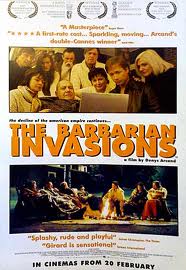
THE BARBARIAN INVASIONS
Canada, 2003, 99 minutes, Colour.
Remy Girard, Stephane Rousseau, Marie- Josee Croze, Marina Hands, Dorothee Berriman, Johanne Marie Tremblay, Pierre Corzi, Yves Jacques, Louise Portland, Dominique Michelle.
Directed by Denys Arcand.
In 1987, Denys Arcand's The Decline of the American Empire was a witty and intellectual treat, a group of Canadians in middle age, assessing their lives and careers, discussing, sometimes profoundly, sometimes fatuously, their interpretation of the world, especially the American-dominated western world. But, the film was not so strong on its dramatic narrative. Then came Jesus of Montreal, 1989, a surprising, complex film that satisfied as drama, as display of characters, as intellectual discussion and as visually arresting. Arcand's films of the 90s were less satisfying. The Barbarian Invasions gathers all Arcand's talents and offers a sequel to The Decline to enjoy and relish.
Arcand and his characters are older and, very often, wiser. Remy Giraud as the dying Remy is the larger than life (which he is soon to leave) focus of the film, a blustering, often raging character who has alienated wife and children but still commands the devotion of friends (the main gallery from Decline whom it is fascinating to listen to 15 years on, joys, regrets and all). When his son - a new barbarian who plays computer games and has never read a book yet is a millionaire financial adviser - is able to relocate his father in a reconditioned hospital room, the older man begins to change as does his son. But, for Arcand, there is no quick sentimentality. The friends still discuss the world and assess their lives. The next generation - who are more preoccupied by money, drugs (and mobile phones) than sex - are challenged in generosity, responsibility and love.
The setting is post 9/11 (pictured shockingly in the film) and Arcand uses this as the basis for his title metaphor - but, who are the new barbarians? The 'illiterate' generation who think money can buy anything - and does? The range of migrants and refugees who pour into the American world? Perhaps the metaphor is over-stated for the realities it refers to.
Arcand has many intriguing, passing observations, especially the characters' Catholic reminiscences, the changes in Catholicism in Montreal in 1966 and the emptying of the Churches of people and statuary. The nun doing pastoral care in the hospital is presented with dignity and sympathy. The film ends with an assisted suicide which seems emotionally satisfying even as it goes against and challenges accepted religious and social standards.
1. The work of Denys Arcand? The acclaim of The Decline of the American Empire? His success with Jesus of Montreal? His films during the 90s? Beginning the 21st the with this strong film? The sequel to The Decline of the American Empire?
2. The Montreal settings, the city, the hospitals, the lake? Its atmosphere of Quebec?
3. The title, the continuation of the decline into barbarian invasions? Who are the new barbarians? The illiterate, those playing computer games, the business culture? The new barbarians at the edge of society, within it? Migrants? The viewpoint from the United States as the centre of the empire? The insertion of the visuals of September 11, 2001, and the television commentary? The point about barbarian invasion with the destruction of the Twin Towers?
4. Arcand and his reliance on verbal humour, wit, the discussions of older people, the isms that they have experienced, university intellectuals? Being clever, their questions, socialist hedonists, hedonism in their life, sexuality? Their Catholic backgrounds, their memories of the past, leading to an amoral stance? Philosophers who need to learn emotions and commitment?
5. The academic world, the world of the teachers, Remy and his final classes, the students, the new teacher?
6. The world of relationships, sexual freedom of the past, moral tolerance, human emotional needs?
7. The themes of age, time passing, appetites waning, illness, death, the need to relate once again to family? Age and its changing perspectives?
8. The framework of the film with Remy dying? His wife and her telephoning Sebastian, his unwillingness to come, the distance from his father, his agreeing to his mother's request, bringing Gaelle? The tension within the family, the expectations? Love? Remy dying and his unwillingness to accept this? Sebastian and his wanting to help his father? The criticism of the crowded ward, paying for the renovations of a new ward, payments to the administration, to the unions? Going to the US for special treatment and his contacts? Gathering together Remy's friends, getting the students to come and paying them off (with the girl refusing to take the money)? His concern about his father's pain, going to the police to inquire about heroin, going to Natalie, going to get the heroin? The policeman and his advice? Asking for the holiday house, going to the lake? The question of his father's death and the reality of dying?
9. The theme of assisted suicide, the right to die, the decision of the person dying, the nature of the means, the execution of the death, the emotions of the person concerned, of the people farewelling the person dying? Moral issues, legal issues? Intellectual understanding of the issue and the consequences?
10. Remy as a character, full of life and energy, rage, his memories, relationships, the friends gathering round, the shared memories? His reconciliation with his son? His having to face dying? The importance of Sister Constance and her presence, her advising him to face the mystery of death? The reality of his death - and the tenderness of having the friends around him, and their farewells?
11. His wife, her suffering, her still loving her husband? The two mistresses and their memories? The gay friend and his companion, Pierre and his having become a family man? The characters, talk, wit, academics of the past? Their cataloguing of the isms? Their game of imagining the best intellectual setting with the number of intellectuals present?
12. Arcand and the theme of crowded hospitals (as in Jesus of Montreal)? The continued tracking down the corridors with the crowds? Sebastian and his bribe? Authorities and unions taking the money? The nurses and their help, the doctors not knowing the identities of their patients? The critique of the health system?
13. Sister Constance, her Communion round, her relating to people, her wise words to Remy, the issue of embracing the mystery, advising Sebastian to tell his father to love him and touch him?
14. Sebastian and his work, his resenting coming to Canada, his coming with Gaelle, their relationship, the preparations for their marriage? His reaction to his father, exasperation, his ability to by anything that he wanted, the computer being lost and offering the money and its being returned? His bold approach to the police about the heroin? Getting Natalie to go to the dealer, to administer the heroin to their father, her collapse, his desperation? The nurse and her helping? His taking his father to the US, to the holiday? The change in himself, the relationship with Natalie? The ending and his future with Gaelle? The scenes with his sister, her escaping from the family, sailing around the world, the satellite links and the two messages, her father watching her on the computer?
15. Natalie, her poor relationship with her mother, her lifestyle, addiction, going to the dealer, the dealer coming to warn Sebastian that she was unreliable? Natalie and the police? Her being out of it, having to bring her to the hospital and direct the dose for Remy when he was undergoing withdrawal symptoms? The supplying of the overdose, her administering it? The final meeting with Sebastian, Remy leaving the house to her and Sebastian letting her stay - and the books? Not being one of the barbarians who didn't read? The irony of the scene where Sebastian did not read but played computer games so competitively? The final kiss and Sebastian saying, "No"?
16. The ending, the older generation and death, coming to terms with their life, Sebastian and Gaelle and the beginning for the next generation?
Published in Movie Reviews
Published in
Movie Reviews
Tagged under